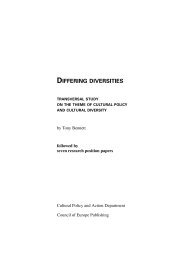Why we need European cultural policies: the impact of EU ...
Why we need European cultural policies: the impact of EU ...
Why we need European cultural policies: the impact of EU ...
You also want an ePaper? Increase the reach of your titles
YUMPU automatically turns print PDFs into web optimized ePapers that Google loves.
This included information about Chapter 20 <strong>of</strong> <strong>the</strong> acquis communautaire on culture and audiovisualpolicy, as <strong>we</strong>ll as chapters on taxation, statistics, intellectual property rights, competitionpolicy and <strong>the</strong> free movement <strong>of</strong> goods and persons.Compendium <strong>of</strong> <strong>cultural</strong> <strong>policies</strong> and trends in EuropeThis was an extremely useful source for information about <strong>the</strong> changes resulting from <strong>the</strong>enlargement.64 Even though it <strong>of</strong>fered ra<strong>the</strong>r general information, it was valuable because itused <strong>the</strong> same methodology to monitor <strong>cultural</strong> <strong>policies</strong> in all countries covered by this project;it also documented <strong>the</strong> most important trends, including updates on legislation, <strong>cultural</strong> policypriorities and orientation. Although <strong>the</strong> Compendium did not refer specifically to legal documentsor policy recommendations originating from <strong>the</strong> <strong>European</strong> Union, it still contained muchinformation about <strong>the</strong> process <strong>of</strong> harmonization as <strong>we</strong>ll as reflections <strong>of</strong> <strong>the</strong> authors <strong>of</strong> countrypr<strong>of</strong>iles about current changes in <strong>the</strong>ir respective countries.QuestionnaireFollowing <strong>the</strong> initial analysis <strong>of</strong> available data and literature, a questionnaire was designed andcirculated.65 The objectives <strong>we</strong>re first, to provide a basis for comparative analysis to testor confirm trends and changes occurring in <strong>cultural</strong> <strong>policies</strong> as a consequence <strong>of</strong> <strong>the</strong><strong>EU</strong> enlargement observed through existing resources. The second aim was to ga<strong>the</strong>r opinionsfrom individuals who <strong>we</strong>re ei<strong>the</strong>r directly involved in <strong>the</strong> process <strong>of</strong> accession or knowledgeableabout <strong>the</strong> issues.I wanted to see if <strong>the</strong> <strong>policies</strong> identified in <strong>the</strong> initial research as having had an <strong>impact</strong> on culture<strong>we</strong>re perceived as such by experts and policy-makers, and also to find out which issues <strong>the</strong>yconsidered pertinent and which <strong>the</strong>y did not see as relevant. Ano<strong>the</strong>r aim was to canvas whe<strong>the</strong>rso far – in o<strong>the</strong>r words since enlargement – <strong>the</strong>re have been any significant changes in <strong>cultural</strong><strong>policies</strong> which connect with o<strong>the</strong>r <strong>policies</strong> identified as having possible <strong>impact</strong> on culture.The questionnaire consisted <strong>of</strong> two types <strong>of</strong> questions, some <strong>of</strong> which requested a personalassessment by <strong>the</strong> respondents and some <strong>of</strong> which requested specific data.Initially, one <strong>of</strong> <strong>the</strong> ideas <strong>of</strong> this research was to include a comparison <strong>of</strong> <strong>cultural</strong> <strong>policies</strong> <strong>of</strong> newmember countries with those <strong>of</strong> old member countries. The point <strong>of</strong> this was to see if enlargementin 2004 had had more or less <strong>of</strong> an <strong>impact</strong> on <strong>cultural</strong> <strong>policies</strong>, when compared with 1995enlargement. Ho<strong>we</strong>ver, such a comparison is not feasible: first, because <strong>the</strong> <strong>European</strong> Union isconstantly changing 66 and secondly, because in <strong>the</strong> new member countries major reforms ino<strong>the</strong>r social and economic spheres are ongoing or anticipated. Thus, analysis based solely on<strong>cultural</strong> <strong>policies</strong> could be misleading.44Part 2 The <strong>impact</strong> <strong>of</strong> <strong>EU</strong> enlargement: results <strong>of</strong> <strong>the</strong> survey <strong>of</strong> researchers and policy-makers














